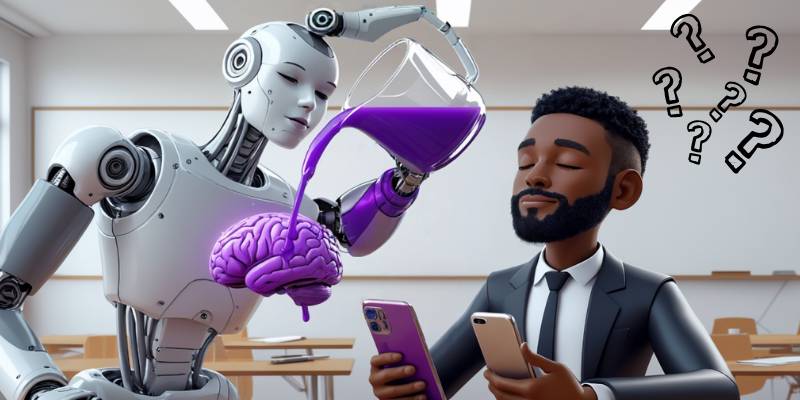Sometimes I catch myself asking Siri the most trivial things—like what the weather’s going to be tomorrow, when I could just glance outside or check an app.
Or I’ll ask ChatGPT to draft a first line for an email, even though I could easily write one myself. And afterward, I wonder: is this making me sharper by saving time, or lazier because I’m not flexing my own brain muscles?
That’s the heart of the debate around AI assistants. Are they tools that free us to think more creatively, strategically, and deeply? Or are they slowly training us to outsource so much that we forget how to think critically at all?
This isn’t a new kind of worry. Every technological leap—from calculators to search engines—has prompted similar hand-wringing. But with AI assistants, the stakes feel bigger. They’re not just answering questions; they’re embedded in our work, our homes, even our health care.
So, let’s pull this apart. This is not just a list of pros and cons. It’s a reflection on how AI assistants reshape us as thinkers and as humans.
Chapter 1: A Short History of Outsourcing Our Minds
Before AI assistants, there were plenty of other “thinking aids.” The abacus, for example, was once feared for making merchants forget arithmetic. The pocket calculator triggered debates in schools about whether kids would ever learn math “the hard way.”
And of course, the internet. Remember when teachers warned us that Google would ruin our ability to remember facts? In a way, they were right—we do look up things constantly. But we’ve also become incredibly good at searching, synthesizing, and filtering.
The point is: outsourcing pieces of our cognitive load isn’t new. The question is whether AI assistants take this further, crossing a threshold where we’re no longer actively engaged.
Chapter 2: What We Mean by “Lazy Thinkers”
When people say AI assistants make us lazy, what they usually mean is this: we stop doing the hard work of thinking through problems ourselves.
A few examples:
- Instead of brainstorming an essay idea, we ask ChatGPT for suggestions.
- Instead of calculating a tip, we use Siri.
- Instead of remembering birthdays, we rely on Google Calendar reminders.
Individually, these don’t seem harmful. But stack them up, and it’s easy to imagine a slippery slope where we no longer practice certain skills.
There’s some evidence here too. A University of Waterloo study showed that heavy reliance on smartphones for information correlated with lower analytical thinking. If AI assistants extend that reliance, the risk is obvious.
Chapter 3: What We Mean by “Smarter Humans”
On the flip side, there’s the argument that AI assistants make us smarter—not because they teach us facts, but because they free us from mental clutter.
Think of it like this: if you’re not spending energy remembering your grocery list, maybe you have more energy to brainstorm creative ideas at work. If you’re not wasting time drafting a boilerplate email, you can focus on strategy.
There’s evidence for this too. A 2023 McKinsey report found that companies adopting generative AI saw productivity gains of up to 40% in certain knowledge tasks. That doesn’t happen if people are getting dumber. It happens because they’re shifting focus.
So perhaps the real measure isn’t whether AI makes us lazy, but whether it changes what kind of thinking we do.
Chapter 4: Personal Stories of Dependency
Here’s where I’ll admit something: I’ve become dependent on reminders. If my phone didn’t ping me about meetings, I’d miss half of them. Ten years ago, I prided myself on remembering everything. Now, I don’t even try.
At first, I felt guilty about this. Then I realized—what if the guilt comes from clinging to an outdated ideal of memory? In a world where tools can remember for us, maybe the smarter move is focusing on what humans still do best: making connections, empathizing, creating.
But that tension—that little pang of “am I getting lazy?”—hasn’t gone away. And I think many people feel it.
Chapter 5: The Role of Emotional AI
When we talk about AI assistants making us lazy or smarter, we can’t ignore the emotional layer. Some assistants are designed not just to help, but to care—or at least simulate care.
This brings in the key insights from The Ethics of Emotional AI Assistants. If an assistant not only helps you draft an email but also says, “I understand this must feel stressful,” does that make you emotionally smarter—more able to reflect on your feelings—or does it make you reliant on machines for validation?
I find this deeply unsettling. On one hand, emotional AI can help people feel supported, especially those who are isolated.
On the other hand, it risks dulling our sensitivity to genuine human emotion. If AI becomes a shortcut for comfort, we may lose the muscle of offering and seeking empathy in real relationships.
Chapter 6: The Complete Guide to AI Companions vs. AI Assistants
We also need to distinguish between AI companions and AI assistants.
- Assistants are task-driven: reminders, scheduling, research.
- Companions are emotionally driven: they talk with you, support you, even simulate friendship.
The complete guide to AI Companions vs. AI Assistants shows us that they push our thinking in different directions. Assistants risk cognitive laziness. Companions risk emotional laziness—outsourcing connection, not just calculation.
But they can also make us “smarter” in different ways. Assistants amplify productivity. Companions can help people practice reflection, even roleplay difficult conversations. The outcomes depend heavily on how they’re used.
Chapter 7: Explained: How AI Assistants Are Entering Healthcare – A Blessing or a Risk?
Nothing tests the lazy/smart debate more sharply than healthcare. Here, AI assistants are not just scheduling appointments—they’re helping patients track medications, offering symptom checks, even reminding people about healthy habits.
The explained: How AI Assistants Are Entering Healthcare – A Blessing or a Risk? debate captures this perfectly.
On one hand, AI assistants can save lives by catching issues early or helping people stick to treatment plans. That makes us collectively smarter—better at managing health.
On the other hand, over-reliance could backfire. If patients blindly follow AI advice without consulting professionals, mistakes could be deadly. There’s also the danger of patients disengaging from their own health decisions, letting machines “do the thinking.”
Here, the balance between lazy and smart isn’t abstract—it’s a matter of safety.
Chapter 8: The Complete Guide to Multilingual AI Assistants
Another fascinating dimension is language. The complete guide to Multilingual AI Assistants highlights how AI is breaking barriers for people worldwide.
Imagine a customer in the U.S. speaking Spanish at home but needing English for work. A multilingual AI assistant bridges that gap instantly. That doesn’t make them lazy—it makes them empowered.
In fact, multilingual AI assistants may expand thinking by exposing us to new languages and cultures. Instead of making us lazier, they give us tools to engage globally.
Of course, there’s also the risk of people leaning so heavily on translation that they never learn the language themselves. But is that laziness, or is it just a new definition of smart—using tools to operate effectively in a globalized world?
Chapter 9: Cognitive Offloading—A Scientific Perspective
Psychologists use the term “cognitive offloading” to describe the act of outsourcing memory or thinking to external tools. Writing notes, using maps, setting alarms—all are forms of offloading.
AI assistants are simply the most advanced version yet. Studies suggest offloading isn’t inherently bad. It can boost efficiency and reduce stress, as long as we remain engaged in higher-level thinking.
The danger isn’t offloading itself—it’s forgetting to re-engage. If we offload everything, our own thinking atrophies. If we offload strategically, we can become more effective thinkers overall.
Chapter 10: Where We Might Be Headed
So, do AI assistants make us lazy thinkers or smarter humans? Honestly, both. They’re mirrors. They reflect how we choose to use them.
If we lean on them mindlessly, they’ll dull our skills. If we engage with them thoughtfully, they’ll amplify our capacity.
The real challenge isn’t the technology—it’s the discipline of using it well. Teaching kids not just how to use AI, but when to use it.
Encouraging workplaces to see AI as an enhancer, not a replacement. And reminding ourselves that critical thinking, empathy, and creativity remain uniquely human strengths—no matter how advanced the assistants become.
Conclusion
AI assistants are not destiny. They’re tools. And like every tool in history, they can make us weaker if we let them, or stronger if we wield them with intention.
So next time you ask Siri, Alexa, Google, or ChatGPT to do something for you, pause for a second. Are you offloading something trivial so you can focus on what matters? Or are you slipping into laziness?
That tiny moment of awareness might be the difference between becoming a sharper, freer thinker—or a passive one.
And maybe that’s the real answer: AI doesn’t decide if we’re lazy or smart. We do.


